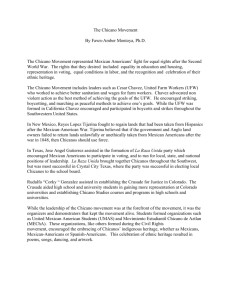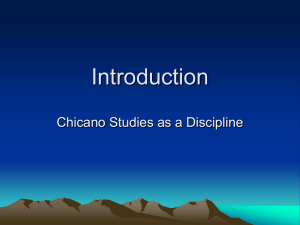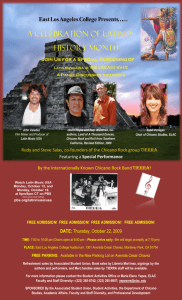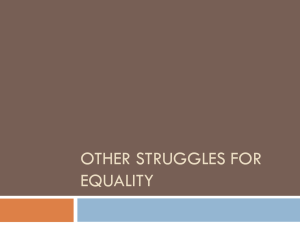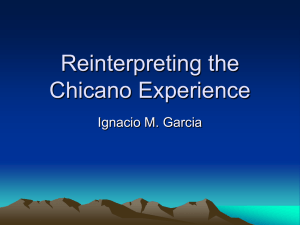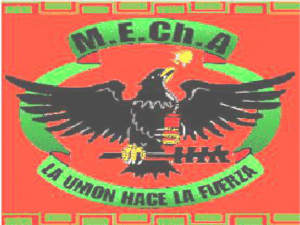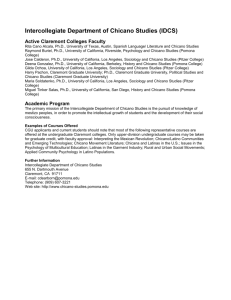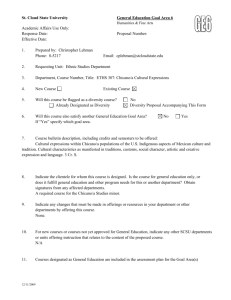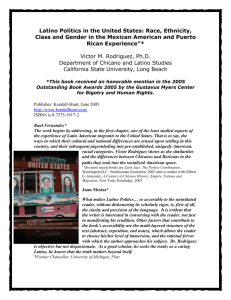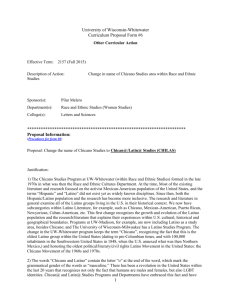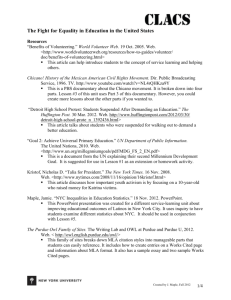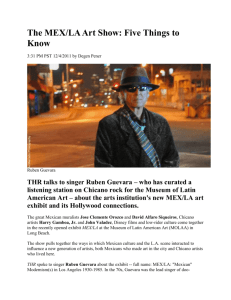Spanish 238 (CHICANO NARRATIVE): WINTER 2013
advertisement
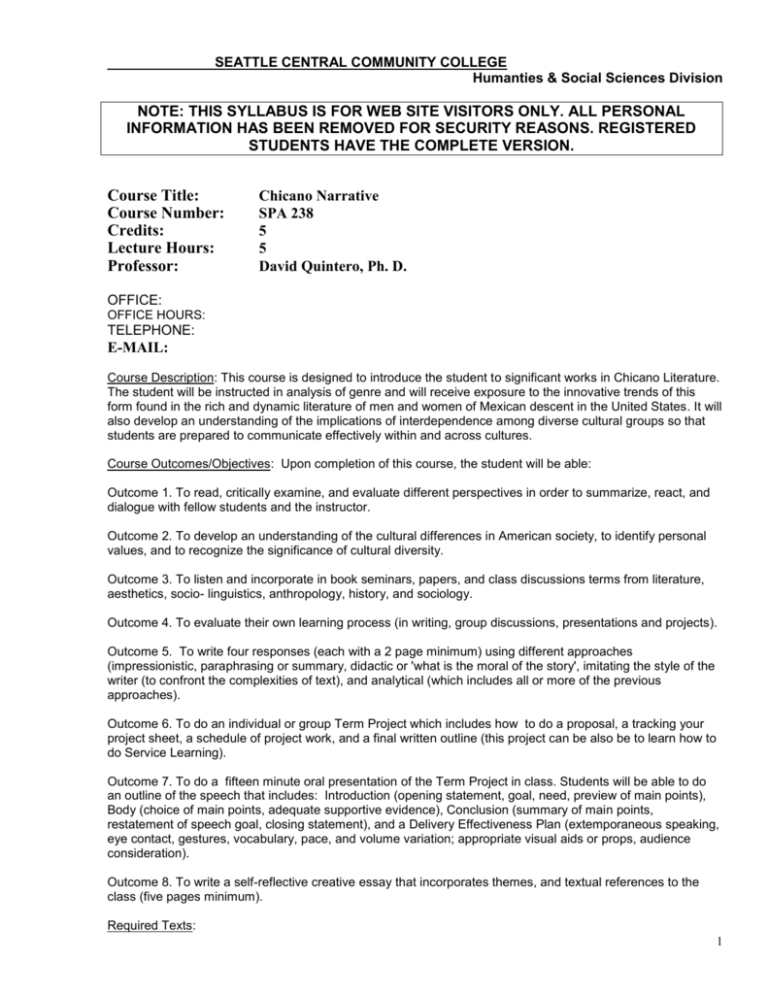
SEATTLE CENTRAL COMMUNITY COLLEGE Humanties & Social Sciences Division NOTE: THIS SYLLABUS IS FOR WEB SITE VISITORS ONLY. ALL PERSONAL INFORMATION HAS BEEN REMOVED FOR SECURITY REASONS. REGISTERED STUDENTS HAVE THE COMPLETE VERSION. Course Title: Course Number: Credits: Lecture Hours: Professor: Chicano Narrative SPA 238 5 5 David Quintero, Ph. D. OFFICE: OFFICE HOURS: TELEPHONE: E-MAIL: Course Description: This course is designed to introduce the student to significant works in Chicano Literature. The student will be instructed in analysis of genre and will receive exposure to the innovative trends of this form found in the rich and dynamic literature of men and women of Mexican descent in the United States. It will also develop an understanding of the implications of interdependence among diverse cultural groups so that students are prepared to communicate effectively within and across cultures. Course Outcomes/Objectives: Upon completion of this course, the student will be able: Outcome 1. To read, critically examine, and evaluate different perspectives in order to summarize, react, and dialogue with fellow students and the instructor. Outcome 2. To develop an understanding of the cultural differences in American society, to identify personal values, and to recognize the significance of cultural diversity. Outcome 3. To listen and incorporate in book seminars, papers, and class discussions terms from literature, aesthetics, socio- linguistics, anthropology, history, and sociology. Outcome 4. To evaluate their own learning process (in writing, group discussions, presentations and projects). Outcome 5. To write four responses (each with a 2 page minimum) using different approaches (impressionistic, paraphrasing or summary, didactic or 'what is the moral of the story', imitating the style of the writer (to confront the complexities of text), and analytical (which includes all or more of the previous approaches). Outcome 6. To do an individual or group Term Project which includes how to do a proposal, a tracking your project sheet, a schedule of project work, and a final written outline (this project can be also be to learn how to do Service Learning). Outcome 7. To do a fifteen minute oral presentation of the Term Project in class. Students will be able to do an outline of the speech that includes: Introduction (opening statement, goal, need, preview of main points), Body (choice of main points, adequate supportive evidence), Conclusion (summary of main points, restatement of speech goal, closing statement), and a Delivery Effectiveness Plan (extemporaneous speaking, eye contact, gestures, vocabulary, pace, and volume variation; appropriate visual aids or props, audience consideration). Outcome 8. To write a self-reflective creative essay that incorporates themes, and textual references to the class (five pages minimum). Required Texts: 1 Rivera, Tomas "... Y no se to tragó la tierra: And the Earth Did Not Part Anaya, Rodolfo , Bless Me. Ultima Castillo, Ana, Massacre of the Dreamers: Essays on Xicanisma Viramontes, Viramontes, Maria. The Moths and Other Stories Additional References: Rodolfo Acuña, Occupied America: A History of Chicanos, --------------------Anything But Mexican: Chicanos in Contemporary Gloria Anzaldúa,La conciencia mestiza/Towards a New Consciousness ----------------------Haciendo Caras, Making Face, Making Souls Richard Rodríguez, Hunger of Memory Oscar J. Martínez, U.S.-México Borderlands Carey McWilliams, North from Mexico, Sommers et. al.Modern Chicano Writers Topical Outline & Maior Divisions: Unit I: Introduction: A Chicano Retrospective A. The Folk Base of Chicano Literature B. Mexican American Literature: A Historical perspective C. Toward the Study of Chicano Colonialism Unit II: The Evolution of Chicano Prose Fiction A. The Chicano Renaissance B. The Search for Identity in Literature C. Critical Approaches to Chicano Literature Unit III. Narrative Genre and Chicano National Culture A. The Migrant Space B. The Barrio Space C. The Mythological Space Responsibilities Primary responsibilities of all participants include flexibility, tolerance, and physical/emotional presence. Written Work/Responses: One written response per book for a total of four responses. (Response number four will be a synopsis of class project). Each response must be a minimum of two pages. The writing must meet minimum requirements in the areas of clarity of thought and expression. Although your writing will be informal or just a response to reading, the following expectations are considered during grading: Expect to write a response paper every other week on the assigned reading. Response papers are similar to “short essays." They are meant to help you prepare for seminar and are written in response to the reading done for the week. All response papers should have an introduction and a conclusion; a minimum of one rephrased example from your textbook, and your developed response to it. I require response papers due to the fact that writing down your ideas, comments, criticisms, and queries about what you have read, helps you to clarify to yourself and then to others what you think about the text. (I would like to encourage you to keep a journal of your affective (emotional), and critical responses to the readings. It may help you with your learning process and perhaps your grade. 2 Readings I expect that you will have done the assigned reading before coming to class. The class activities will assume that you have the background from the reading. All reading is to be done by date specified in the schedule below. Many assignments will be given out in class only and as needed. The schedule presented below is given in detail for the first weeks and in a general outline for the remainder of the quarter. Attendance Engagement and active participation is required. Participation includes taking part in class discussions and exercises, asking questions, commenting, enabling others to participate, and actively listening. Addressing Controversial Issues This is a laborious and very valuable skill which you may have may opportunities to practice. Our major goal will be to create a classroom climate that encourages healthy intellectual conflict (the kind that leads to emotional growth) and discourages personal attack. This course focuses on the ideologies that shape and create past and present experiences and not on personal opinions, ideas or beliefs. This means that we will exploring our perceptions of the dominant society's attitudes and portrayals. Seminar Requirement You will be working in groups in and out of class. This is the heart of a cultural class such as this and preparation for these meetings is crucial. You must complete the assignments and the readings before each seminar and bring your response papers to the group for discussion, and for grading. Learning to understand alternative points of view is essential to becoming a sophisticated thinker and experience learner. Before one can appreciate other points of view one must hear them. That is one reason I ask that you work in groups, so that you can hear yourselves. Project Requirement During the ninth week of the quarter, students will start presenting a term project to the entire class. The nature of each project should relate to ideas and concepts generated in class. This is your opportunity to put your creative talents into communicating with others within an creative framework. You may present your creation in an interactive manner, in groups, or as an individual statement. The choice of medium and topic is up to you but must be cleared through me. A sign-up sheet will be set up during the fifth week. No late projects/presentations accepted. We will discuss class projects further in class. Methods of Instruction: Natural Approach, Direct Method, Situational Approach, Total Physical Response, and Lectures, are few of the methods used in class. It has been my experience that a multiple combination of approaches allows learners to experience the Latino cultural diversity as participants in a compelling panorama of situational surprises and emotions --achieving cultural diversity via literature language proficiency skills in a much more realistic learning environment. Seminar methodology is also a key component of this course. Students work in groups in and out of class. This is the heart of a cultural class such as this and preparation for these meetings is crucial. Student must complete the assignments and the readings before each weekly seminar and bring your response papers to the group for discussion, and for grading. Methods of Evaluation: Credit will be awarded for participating in and completing the work of the program according to the following criteria: Attending and actively participating in all program activities. Coming to seminar, lectures, and presentations on time and prepared. Submitting completed assignments on time. Submitting four response papers (1 or 2 typed pages). 3 Submitting the mid-quarter essay (5 typed pages minimum). Presenting your project to the group (15 minutes oral presentation). Response Work & Seminar Term Project: (Proposal, Outline of Presentation, Oral Presentation, Annotated Bibliography) Attitude & Participation Term Essay/Exam – Written 20% 30% 10% 40% Community Service / Proiect and Presentation: This project can be done individually or with a group. Students can also work with the Division of Continuing Education/Cooperative Education. Schedule of Study: Will be discussed in class ADA ACCOMMODATION STATEMENT If you need course adaptations or accommodations because of a disability, if you have emergency medical information to share with me, or if you need special arrangements in case the building must be evacuated, please make an appointment with me as soon as possible. Schedule of Study: The following is intended as a guide and may be readjusted as necessary. Weeks 1 & 2: Introduction: A Chicano Retrospective The Folk Base of Chicano Literature Mexican American Literature: A Historical perspective, Acuña’s “Legacy of Hate: The Conquest of the Southwest.” Almaguer’s “Toward the Study of Chicano Colonialism.” Movie:m“The Ballad of Gregorio Cortés” Weeks 3 & 4: The Evolution of Chicano Prose Fiction The Discursive Act,, Hegemony, and Resistance: Conclusion of the Oral Tradition Century. The Chicano Renaissance: Jose Antonio Villarreal, Pocho Weeks 4 & 5: The Search for Identity in Literature Critical Approaches to Chicano Literature The Migrant Space of Tomas Rivera’s …And The Earth Did Not Devoured Him Weeks 6 & 7: The Mythological Space Raul Anaya’s Bless Me, Ultima Midterm Weeks 8 & 9: Chicanas as Subject Narrators Amplification of Chicano National Culture: Helena Maria Viramontes, The Moths Ana Castillo, Massacre of the Dreamers Weeks 10: Chicano Laughter: Culture Clash Week 11 & 12: Presentations 4 5
